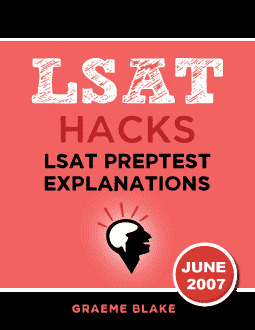DISCUSSION: On a main point question, it’s important to think about the author’s opinion. Here, the author thought:
- We should not change copyright.
- Linking isn’t infringement.
- Copyright holders should restrict their pages if they don’t want them seen.
The first point is most important. It’s only two lines in the passage (lines 52-54), but everything else was leading up to it.
___________
- CORRECT. This matches. The first half is the author’s evidence, and the line starting from “creating such a link….” is their conclusion.
- Nice thought, but the author didn’t say this. In lines 52-54 they said we shouldn’t change copyright law. And nowhere else did they say when we should change it.
- This misses the author’s conclusion, and also manages to misrepresent their argument. Lines 49-51 clearly say that restricting web sites would compromise the openness of the web somewhat.
- This answer is a load of gibberish. I’ll give an example of a situation that matches it.
I want to be clear: electronic media did not create any new intellectual property rights. Either in the real world or in this passage. So, to make a situation matching this answer, I had to invent a hypothetical world where IP owners did get new rights as the result of technology.
Example of gibberish situation: New electronic media like Facebook have created new intellectual property rights. Now, if you post a word from a movie title on Facebook, you must pay movie studios a licensing fee.
This could seem worrying. But, we can fix it by applying good ol’ common sense principles like “The Golden Rule”. If movie studios think about how we would like to be treated, then they won’t abuse their power to collect licensing fees. - This is subtly off. The new copyright laws wouldn’t be aimed at restricting the web’s growth. That’s just a side effect. And the author’s point wasn’t just that benefits are higher. Their point is that therefore we shouldn’t change copyright laws.


Leave a Reply